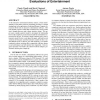4420 search results - page 43 / 884 » Evaluating a Computational Model of Emotion |
FDG
2009
ACM
14 years 2 months ago
2009
ACM
As the interactive entertainment industry matures, a better understanding of what makes software entertaining is needed. A natural starting point is the application of traditional...
IPPS
1998
IEEE
13 years 12 months ago
1998
IEEE
The paper presents how the Random PROLOG Processor (RPP), a bio-inspired model of computations, can be used for formalization and analysis of a phenomenon - the Collective Intelli...
ATAL
2006
Springer
13 years 11 months ago
2006
Springer
Intelligent agents are typically situated in a social environment and must reason about social cause and effect. Such reasoning is qualitatively different from physical causal rea...
INTETAIN
2009
Springer
14 years 2 months ago
2009
Springer
The current work presents the affective interface adaptations in the Musickiosk application. Adaptive interaction poses several open questions since there is no unique way of mappi...
ACMACE
2007
ACM
13 years 11 months ago
2007
ACM
The demo will show two highly expressive virtual agents introducing the audience to a traditional Japanese room. The agent models and gestures have been created by a professional ...


